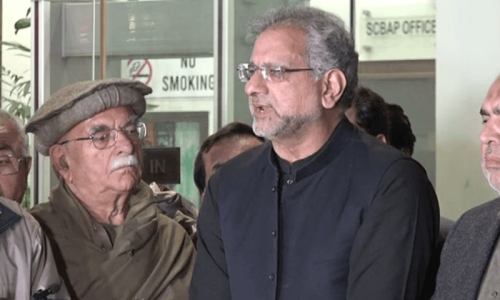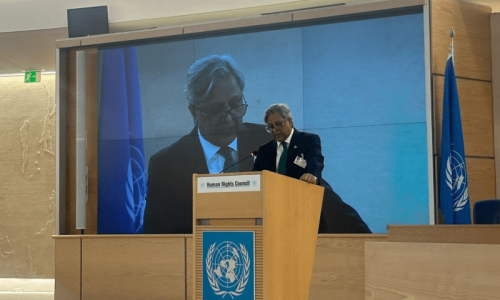ISLAMABAD: The Supreme Court acceding to the federal government’s request on Wednesday suspended the Sindh High Court (SHC) decision of Aug 17 to quash the fact-finding report and the notifications on the formation of inquiry commission on sugar.
A three-judge SC bench comprising Chief Justice Gulzar Ahmed, Justice Mushir Alam and Justice Ijaz-ul-Ahsan suspended the high court order after granting leave to appeal to the federal government petition.
Attorney General for Pakistan Khalid Jawed Khan, who filed the appeal on behalf of the federal government, argued before the apex court that the formation of the inquiry commission was not against the law and that the commission report was based on facts that needed to be established by relevant agencies such as the Federal Investigation Agency (FIA), Securities and Exchange Commission of Pakistan (SECP), National Accountability Bureau (NAB) and anti-corruption department after conducting their own inquiries. Therefore, the AG asserted, that no prejudice would cause or likely to be caused to sugar mill owners.
Accepts federal govt’s appeal for hearing; AG says court can condone errors in implementation of public duties
The top law officer contended that the federal cabinet had also decided that relevant authorities could take action against any member of the Sugar Mills Association of Pakistan (SMAP) only after completing their own investigations.
The AG, however, rubbished the allegations of element of bias in the commission report. He argued that this was misconceived as complete opportunity of hearing was afforded to the SMAP during which requisite information was provided by the respondent sugar mills.
Moreover, the commission report did not cause any personal harm to sugar mills rather the observations made in the report were “general in nature”.
The AG contended that the SMAP was not only on board but all the sugar mill owners were aware of the commission’s undertaking of its probe into the allegations. At no stage, he claimed, had the SMAP ever objected to the functioning of the commission.
ISI’s representation
Mr Khan argued that merely a publication of the notification regarding the appointment of the commission in the official gazette under the Inquiry Commission Act 2017 would not render the commission invalid. His argument was made in the background that though the March 16 notification on the constitution of the commission was printed in the gazette, the March 25 notification regarding the addition of Inter-Services Intelligence (ISI) representative among the members of the commission was not published in the gazette.
But the AG said that approval of the cabinet was given and merely floating of the summary by the Ministry of Interior instead of the cabinet division could not prejudice the commission report as has been held in the 2016 Mustafa Impex case where observations were made that the court enjoyed the power to condone any procedural errors in the implementation of public duties under the rules of business.
The federal government in its petition had contended that the SHC quashed the notification for the appointment of the commission on pure technical grounds.
The petition argued that the glaring yet completely ignored reality was that the real and truly aggrieved party in this matter were millions of captive consumers, who were being grossly overcharged the price of an essential commodity i.e. sugar by a cartel of sugar manufacturers completely dominating the market, the petition regretted.
Besides the consumers, there were thousands of cane growers who were also the aggrieved party as they had been consistently denied adequate payments for the produce, the petition said.
The public at large also suffered billions in evaded taxes owing to under-reporting of the actual production by the manufacturers, the petition alleged. In order to redress these grievances and to make an essential commodity available to public at a reasonable cost while ensuring swift recovery of revenue, an impartial commission of inquiry comprising public servants of unimpeachable reputation were appointed by the federal government to unravel the true facts and expose the inner workings of this industry, the petition said.
It added the exercise undertaken by the commission could not be aborted or stopped on the assumption that the reputation of the respondents could be adversely affected. The remedy for damage to the reputation, if any, could lie in a suit but not in writ jurisdiction nor could any finding on disputed facts be given in writ jurisdiction, the petition argued.
According to the petition, the federal government or its functionaries are under obligation to act in public interest and probe all cases and to promptly follow up the proceedings before departments, authorities or bodies as they directly affect the fundamental rights of the people at large.
Published in Dawn, September 3rd, 2020












































